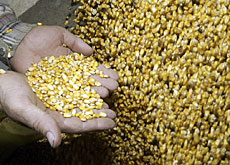UN rapporteur calls for action on food crisis

The United Nations special rapporteur on the right to food has urged donors to increase humanitarian aid or see more people dying of starvation in the coming months.
Jean Ziegler made the appeal as 27 key UN agencies met in the Swiss capital, Bern, on Monday to come up with solutions to ease the escalating global food crisis.
Ziegler referred to the situations in the Palestinian territories and Darfur, Sudan, where the United Nations Relief and Works Agency for Palestine Refugees in the Near East (UNRWA) and the World Food Programme (WFP) urgently need additional funds to offset higher food prices.
“It’s absolutely critical. These people have no other alternative but international aid. If this is reduced or cut, they will die,” the Swiss told journalists in Geneva.
He described the UN meeting in Bern as an “essential day for people suffering from hunger in the world”.
Ziegler, who officially ends his special rapporteur mandate on Wednesday, said the poor were facing a new tragedy, hit by the extreme violence of rising food prices.
“The food riots that have affected 37 countries will worsen. The number of people affected by malnutrition will increase in the next five to six years,” said the 77-year-old sociologist.
The World Bank estimates food prices have risen by an average of 83 per cent in the past three years, and warns that food inflation could push at least 100 million people into poverty.
A range of factors has been blamed on the food crisis, including poor harvests, partly due to climate change, rising oil prices, steep growth in demand from China and India, and the dash to produce biofuels for motoring at the expense of food crops.
Primary causes
Ziegler blamed the crisis principally on biofuels and repeated his call for an immediate international five-year ban on biofuel production.
“Biofuels are a crime against a large part of humanity,” he declared.
The Swiss rights advisor criticised the fact that a third of United States corn was grown to produce bioethanol and hit out at the European Union decision to produce ten per cent of its energy from biofuels by 2020.
Christophe Golay, a researcher at the Graduate Institute of International and Development Studies in Geneva, agreed that the impact of biofuels could not be ignored.
“Today five per cent of cereals grown worldwide are used to produce biofuels, which obviously has an impact on prices. It’s the first cause of price rises for certain cereals, but not all,” he told swissinfo.
Ziegler also pointed the finger at commodity speculation, claiming it was responsible for 30 per cent of the price rises, in particular hedge fund investors, who have “shifted to agricultural raw materials where yields are enormous”.
But Burkhard Varnholdt, chief investment officer at Bank Sarasin, dismissed this argument.
“Security”
“Most investors I know are deeply against investing in commodities,” he told swissinfo. “What really happened after the subprime crisis was that risk aversion rose around the world. When this happens you don’t invest in commodities. The natural thing is to search for security in government bonds or cash – and that’s what happened.”
In his address, Ziegler also took a swipe at the “absurd” policies of the International Monetary Fund, which he said forced the poorest countries to cut back on staple crops and focus on cash crops for export to help pay their debts.
For Golay, the root causes of the current food crisis are clearly structural.
“There are four main causes that everyone is talking about: biofuels, increased demand in China and India, higher oil prices and global warming. But the real cause is that for decades there has not been proper investment for years in local agriculture in developing countries.”
“These countries are dependent on food imports – for up to 40 per cent of their food – so when the prices rise on global markets they can’t offset them with local agriculture.”
Results of the Bern deliberations are expected on Tuesday when Ban Ki-moon gives a news conference flanked by the heads of the main UN agencies and the World Bank.
swissinfo, Simon Bradley in Geneva
Since 2007 wheat prices have gone up by 130%, soybeans by 87% and corn by 31%, according to Bloomberg.
The UN Food and Agricultural Organization says rice has gone up by 70% in the past year.
Some countries – including India, China, Vietnam and Egypt – have banned the export of rice.
1,000 – 2,000 litres of water is needed to produce 1kg of wheat
10,000 – 13,000 litres of water is needed to produce 1kg of beef.
The world population has grown from 2.5 billion in 1950 to 6.1 billion in 2000 and is projected to reach 9.2 billion by 2050.
There have been food riots and protests in Bangladesh, Burkina Faso, Cameroon, Egypt, Ethiopia, Haiti, Indonesia, Ivory Coast, Senegal, Yemen, Mexico, Niger and the Philippines.
The 73-year-old Jean Ziegler is a former professor of social science and economics at the universities of Geneva and the Sorbonne in Paris.
He was a prominent member of the centre-left Social Democratic Party in the Swiss parliament until June 1991.
In 2000 he was appointed UN Special Rapporteur on the Right to Food, a mandate that runs out at the end of April.
He was recently elected as a member of the Advisory Committee of the UN Human Rights Council – a think-tank for the 47-nation body.
He has a reputation as an outspoken critic of globalisation.

In compliance with the JTI standards
More: SWI swissinfo.ch certified by the Journalism Trust Initiative












You can find an overview of ongoing debates with our journalists here . Please join us!
If you want to start a conversation about a topic raised in this article or want to report factual errors, email us at english@swissinfo.ch.